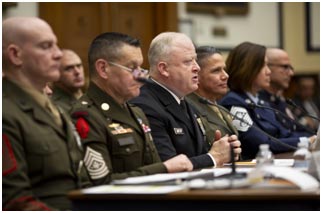 Master Chief Petty Officer of the Navy James Honea, center, testifies alongside other top enlisted leaders during a House Armed Services Committee Quality of Life Panel hearing Jan. 31 in the Rayburn Building on Capitol Hill in Washington, D.C. (Photo by Mike Morones/MOAA)
Master Chief Petty Officer of the Navy James Honea, center, testifies alongside other top enlisted leaders during a House Armed Services Committee Quality of Life Panel hearing Jan. 31 in the Rayburn Building on Capitol Hill in Washington, D.C. (Photo by Mike Morones/MOAA)
Members of the House Armed Services Committee’s special panel on quality of life heard about moldy barracks, substandard housing, child care and health care delays, food insecurity, and high spouse unemployment from DoD’s top enlisted leaders during a Jan. 31 hearing – testimony that, at times, sounded like a broken record.
[TAKE ACTION: Urge Your Legislators to Improve the Quality of Life of Our Servicemembers]
So, what’s different this year?
The quality of life panel will recommend proposals to address these issues in the FY 2025 National Defense Authorization Act, which already is taking shape in Congress. MOAA looks forward to working with the panel’s members and staff to move these proposals forward, as many of them will address key MOAA legislative priorities.
These proposals will require significant investments, at a time when Congress is still fighting over unfinished budgets and appropriations due last year. It’s a big obstacle to overcome; the budget fight has left us with a continuing resolution that wastes tax dollars that could be spent on barracks and housing.
[TAKE ACTION: Ask Your Lawmakers to Pass a Budget]
The Panel in Action
Panel chairman Rep. Don Bacon (R-Neb.) and its ranking member, Rep. Chrissy Houlahan (D-Pa.), are well-versed in the challenges facing our servicemembers and their families, as both served in uniform. All of the panel members are invested in the outcomes of the panel and receive frequent complaints from military communities in their districts.
Bacon and Houlahan used their opening remarks at the hearing to note the estimated $137 billion in deferred maintenance cost for installation facilities, along with the ongoing challenges of child care access, health care wait times, and providing adequate housing.
[VIDEO: Watch the Full Quality of Life Hearing]
Enlisted leaders addressed all those topics and others during their testimony. Troy Black, the senior enlisted advisor to the chairman of the Joint Chiefs of Staff and a former sergeant major of the Marine Corps, told the panel that “adequate, consistent, available, and timely health care for our servicemembers is the minimum standard and vital to the all-volunteer force.”
Master Chief Petty Officer of the Navy James Honea, whose wife also attended the hearing, described his own experience as a junior sailor, where after paying for rent and utility bills, he and his wife had about $50 left to buy food at the commissary. He also referenced the original commission on an all-volunteer force and noted how family dynamics have changed.
“From the Gates Commission of 1970, there were five pillars recommended to sustain a cost effective all-volunteer force: (1) military pay and compensation, (2) quality health care, (3) quality housing, (4) a retirement plan, and (5) ensuring the military remains a reflection of our society,” Honea wrote in his prepared testimony. “These five pillars were necessary to create the all-volunteer force and these pillars still hold true today. However, a much greater preponderance of our force now are married or are single parents, and we should consider adding support to the military family as a sixth pillar, to include family dynamics such as spousal employment and child care.”
Lack of Quality Housing
Each enlisted leader stressed the importance of restoring the Basic Allowance for Housing (BAH) to cover 100% of rental and utility costs – an issue at the heart of MOAA’s Advocacy in Action campaign this year and part of our spring advocacy efforts in 2023. They discussed the negative impacts of the 5% cut to BAH on servicemembers and their families.
Authority to provide BAH to single enlisted personnel and move them out of substandard conditions is also a challenge; restoring BAH can help on both fronts.
[TAKE ACTION: Ask Congress to Support the BAH Restoration Act]
As MOAA begins preparations for the Advocacy in Action event, we will rely on grassroots advocacy from our members, who can engage their lawmakers on the Hill, in their home districts, and on the campaign trail during this election year regarding this much-needed housing benefit restoration.
Asking for specific legislation and getting beyond the “support the troops” sentiment is critical to building support. Ask your lawmakers to co-sponsor the BAH Restoration Act and have the bill numbers ready; click these links to see whether they already are co-sponsors: H.R. 2537 | S. 1823.
[RELATED: TRICARE For Life, Star Act, Housing Help Will Anchor MOAA’s Spring Advocacy Push]
Outside of in-person engagement, you can:
- Register for our Legislative Action Center and recruit your network of friends and family to do the same – MOAA membership is not required.
- Encourage members of your network to contact their representatives at 866-272-MOAA (6622), MOAA’s toll-free line to the U.S. Capitol switchboard. Ask to speak with the military legislative assistant (MLA) in the office; if that staffer is not available, consider scheduling a follow-up call to make a personal connection with legislative staff.
- Keep up with the latest on all of MOAA’s legislative initiatives at MOAA’s Advocacy News Page.
MOAA Knows Why You Serve
We understand the needs and concerns of military families – and we’re here to help you meet life’s challenges along the way. Join MOAA now and get the support you need.